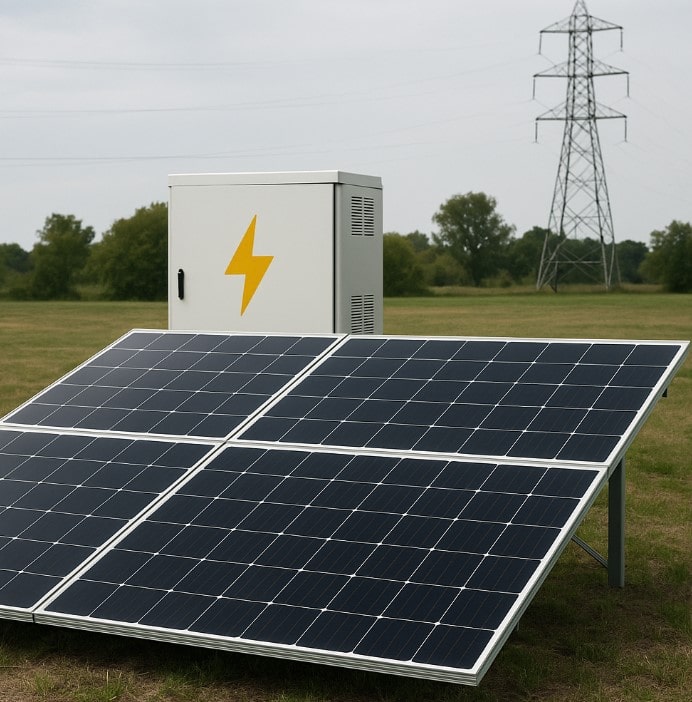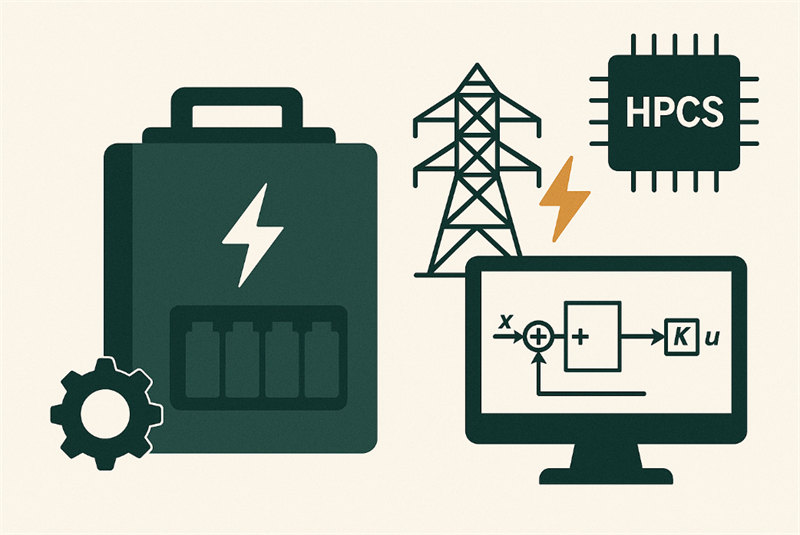

Alors que la transition mondiale vers les énergies renouvelables s’accélère, systèmes de stockage d'énergie (SSE) Les systèmes de contrôle haute performance (HPCS) sont devenus indispensables pour maintenir la stabilité du réseau, gérer les pics de charge et assurer la continuité de l'alimentation électrique. Cependant, la complexité croissante de l'intégration de sources d'énergie diversifiées, de charges variables et de flux d'énergie bidirectionnels nécessite des stratégies de contrôle et de gestion plus intelligentes. Les systèmes de contrôle haute performance (HPCS) se sont imposés comme une technologie clé pour répondre à ces exigences.
Dans cet article, nous explorons comment les technologies HPCS améliorent la modélisation, la simulation et le contrôle en temps réel des systèmes de stockage d'énergie modernes, en particulier dans les applications renouvelables connectées au réseau et hybrides.

Les systèmes de contrôle haute performance sont des plateformes informatiques avancées équipées de systèmes d'exploitation temps réel, de processeurs haute vitesse et d'algorithmes de contrôle optimisés. Conçus pour gérer des tâches de contrôle complexes et haute fréquence avec une synchronisation déterministe, ces systèmes sont parfaitement adaptés à la gestion des systèmes de stockage d'énergie par batterie (BESS), des volants d'inertie, des supercondensateurs et des architectures de stockage hybrides.
Traitement en temps réel : Réponse de contrôle au niveau de la milliseconde pour la régulation de la tension, du courant et de la fréquence.
Évolutivité : Les architectures modulaires prennent en charge l’intégration avec les micro-réseaux, les ressources énergétiques distribuées (DER) et le stockage à grande échelle des services publics.
Déploiement d'algorithmes avancés : Prend en charge la mise en œuvre du contrôle prédictif du modèle (MPC), du filtrage adaptatif et de l'optimisation basée sur l'IA.
Acquisition et analyse de données : Enregistrement de données à haut débit pour le diagnostic, l'optimisation des performances et la maintenance prédictive.
Avant de déployer des stratégies de contrôle en temps réel, il est essentiel de disposer d'un modèle détaillé et précis du système de stockage d'énergie. Les plateformes HPCS permettent une modélisation intégrée, permettant ainsi la simulation en temps réel et les tests Hardware-In-the-Loop (HIL). Ceci est essentiel pour valider la logique de contrôle dans diverses conditions de fonctionnement.
Modèle électrique : Capture les caractéristiques de la batterie, les modèles de circuits équivalents (par exemple, les modèles Thevenin ou RC), la résistance interne et l'état de charge (SoC).
Modèle thermique : Simule la dynamique thermique pour assurer le contrôle de la température et la longévité du système.
Modèle de dégradation : Prédit le vieillissement et la diminution des capacités, permettant ainsi de prendre des décisions de contrôle tenant compte du cycle de vie.
Modèle d'interaction de grille : Reflète les variations de tension du réseau, les écarts de fréquence et les contraintes de flux de puissance.
Ces modèles peuvent être mis à jour en continu à l'aide de données de capteurs en temps réel et d'algorithmes d'estimation adaptatifs, garantissant que la logique de contrôle reste précise pendant toute la durée de vie du système.
Une fois qu'un modèle robuste est en place, HPCS peut exécuter des stratégies de contrôle en temps réel sophistiquées pour garantir des performances et une sécurité optimales.
Gestion SoC et SoH : Estimation et gestion précises de l'état de charge et de santé de la batterie.
Optimisation de la charge/décharge : Ajustement dynamique des flux d'énergie en fonction de la demande de charge, du prix de l'électricité et des prévisions de production d'énergie renouvelable.
Services de réseau : Régulation de fréquence, support de tension, provisionnement de réserve tournante et capacité de démarrage à froid.
Détection et récupération des pannes : Surveillance en temps réel des surtensions, des surintensités, des excursions thermiques et des menaces cyberphysiques.
Ces fonctions sont mises en œuvre via une architecture de contrôle en couches, comprenant généralement :
Contrôle primaire : Réponse rapide pour la stabilisation tension/courant.
Contrôle secondaire : Gère l'équilibre SoC et le partage de l'alimentation entre plusieurs unités de stockage.
Contrôle tertiaire : Gère la répartition économique, la planification et la communication avec les opérateurs de réseau ou les marchés de l'énergie.
Le déploiement de HPCS pour le contrôle du stockage d'énergie implique à la fois l'intégration matérielle et logicielle :
Sélection du matériel : Processeurs en temps réel tels que ARM Cortex-R, DSP ou systèmes basés sur FPGA avec canaux ADC/DAC dédiés.
Protocoles de communication : Prise en charge de Modbus, CAN, Ethernet/IP et IEC 61850 pour l'intégration SCADA et réseau.
Cybersécurité : Mécanismes de sécurité intégrés, notamment le cryptage, l’authentification et la détection d’intrusion.
De plus, les HPCS doivent être conformes aux codes de réseau (par exemple, les normes IEEE 1547, ENTSO-E) et prendre en charge les mises à jour et les diagnostics du micrologiciel à distance.
Les systèmes de contrôle haute performance transforment le paysage des technologies de stockage d'énergie. Grâce à une modélisation précise et un contrôle en temps réel, les plateformes HPCS permettent des systèmes de stockage plus sûrs, plus efficaces et plus réactifs au réseau. Face à la demande croissante de résilience et de flexibilité énergétiques, investir dans des solutions HPCS est non seulement bénéfique, mais essentiel.
abonnez-vous à nous pour profiter des prix des événements et obtenir certains des meilleurs prix.
 réseau ipv6 pris en charge
réseau ipv6 pris en charge

